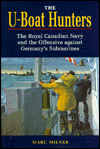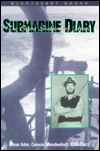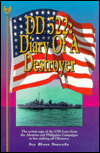The U-Boat Hunters
The Royal Canadian Navy and the Offensive
Milner, Marc
1994, United States Naval Inst.
ISBN 1557508542
Hardcover, 326 pages, 3 maps, 2 figures, 50 b&w photos
| Type. | General History |
| Pros. | Carefully researched and fascinatingly told |
| Cons. | None to speak of |
| Rating. |  |
 This volume constitutes a sequel to Dr. Milner's previous North Atlantic
Run which covered the Canadian Navy's conduct of their part in the Battle
of the Atlantic from war's outbreak in September, 1939 to about mid-1943. In
this volume he continues the story of the Navy's increasing confidence,
ability and contribution to that battle, through to the war's end.
This volume constitutes a sequel to Dr. Milner's previous North Atlantic
Run which covered the Canadian Navy's conduct of their part in the Battle
of the Atlantic from war's outbreak in September, 1939 to about mid-1943. In
this volume he continues the story of the Navy's increasing confidence,
ability and contribution to that battle, through to the war's end.
In the early years, the Navy's too-rapid growth, from some 10 warships in 1939 to almost 400 by May of 1945, created vast problems of training, administration and supply which led to what seemed to others a hapless group of inexpert escort vessels, and thus severe criticism by the unknowledgable of its performances as convoy escorts, the RCN's primary responsibility. It had grown too rapidly, and this showed, for instance in the manning of new construction corvettes and even armed motor yachts by ex-merchant marine seamen with little anti-submarine or escorting experience or by the RCNVRs, the volunteers, often, even C.O.s, at age 23 to 25 who knew little about ship handling let alone A/S tactics. So too equipment was often years out of date as the technologies advanced rapidly, in radar, voice radio, and direction-finding. The battle-controlling Royal Navy became critical of the losses suffered by convoys under Canadian Escort Group protection, with little awareness of the root causes, often of their own making. For example, an early group of 10 corvettes, built in Canada for the RN's account, were delivered to the UK by scratch Canadian crews appointed just for that purpose. On arrival, because the RN could not man these ships due to their own pressing requirements, the RCN crews, some 500 men, were retained, the ships taken into the RCN instead - largely untrained and ill-manned for the job. "Just do a trip or two, and then we'll take over." They never did, but criticised the inept Canadians who simply had to learn on the job. Better an ill-prepared escort than none at all.
With this continuing story, Milner picks up the tale as the Canadians returned to the battle, with newer and better ships, now more of them with radar, the faster frigates, the squid ahead-throwing weapon fitted Castle Class corvettes. Soon too there were enough ships in the RCN's fleet to provide for hunting groups, not just convoy close escorts. After three and a half years of the new style warfare, the Canadians, now about 66% RCNVRs, had gained the necessary experience. Favourable results began to appear. Groups were even commanded by Canadian RCNVRs, U-boats were sunk with rising frequency. It was not all roses - equipment was still in short supply; the RCN was still often left to escort the slow and more vulnerable convoys. Those at home, in a "we can do it ourselves" attitude, were now directing their warships not to accept improved RN radars but use Canadian-built and, it developed, very much inferior sets. This situation was called by one author "The Great Naval Battle of Ottawa" (David Zimmerman, U of T Press, 1989). But, in the end, the Canadians, alone or with others, sank some 33 U-boats at a cost of 19 warships sunk by the enemy, German and Italian. Again Milner illustrates the new battle with well told examples of success, determination and the coming of age of the RCN as it developed its own traditions in this new battle, as The U-Boat Hunters. Proper inter-ship training as a well coordinated Group was still too rare and too brief, compared to the RN groups. It took a brave Canadian C.O., usually a VR, to refuse to give up a promising A/S contact to an arriving RN Group, typical of the vignettes Milner uses to enlighten his tale. The Canadians now often "handled the attack superbly," as Milner says of one September, 1944 U-boat sinking.
Again, a book well worth having on the bookshelf, an exciting read in its own right, and much more heartening than the story in his first volume. If you only have a couple of books on Canada's part in the Atlantic Battle, these two should be the ones.
Review written by CDR Fraser M. McKee, Ontario, Canada.
Published on 28 Oct 2001.
This title is highly recommended.
Purchase information: (info) Get The U-Boat Hunters now at amazon.com ($ 24.99)
Get The U-Boat Hunters now at amazon.com ($ 24.99) Get The U-Boat Hunters now at amazon.co.uk
Get The U-Boat Hunters now at amazon.co.uk
Return to our main review page.



